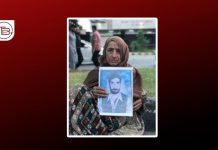Pakistan’s Apex Committee has approved a “comprehensive military operation” against Baloch armed groups in Balochistan after a series of deadly attacks, including a suicide bombing at Quetta Railway Station that killed dozens of soldiers.
The decision was made during a meeting of the Federal Apex Committee of the National Action Plan in Islamabad, chaired by Prime Minister Shehbaz Sharif. Federal ministers, provincial chief ministers, and Army Chief General Asim Munir attended the session.
A statement from the Prime Minister’s Office said the operation would target groups such as the Baloch Liberation Army (BLA), its Majeed Brigade, the Balochistan Liberation Front (BLF), and the Baloch Raaji Ajoi Sangar (BRAS).
The groups were accused of destabilizing Pakistan and disrupting economic progress, allegedly acting “on behalf of hostile external powers.”
The announcement follows a string of high-profile attacks in Balochistan. On 9 November, a suicide bomber from the BLA’s Majeed Brigade targeted military personnel at Quetta Railway Station, killing 31 non-commissioned officers of the Pakistan Army and injuring more than 60 others.
Last week, the BLA claimed responsibility for an attack on a military camp in Kalat, where it reported killing 29 soldiers and seizing weapons. Pakistan’s military, however, confirmed eight fatalities and 17 injuries.
BRAS, a coalition of Baloch armed groups, has also intensified its activities. Over the past two weeks, it claimed responsibility for 45 coordinated attacks across Balochistan, including strikes on military camps, highways, and infrastructure, causing significant casualties.
Pakistani Prime Minister Sharif voiced concern over the escalation of violence. “Terrorism was largely brought under control a few years ago, but recent attacks have drawn international criticism toward Pakistan,” he said.
The committee also reviewed the country’s security landscape, discussing measures to counter terrorism, sub-nationalism, religious extremism, and the crime-terror nexus.
Participants emphasized the importance of countering disinformation campaigns and revitalizing the National Counter Terrorism Authority. Plans were announced to establish National and Provincial Intelligence Fusion and Threat Assessment Centres.
Meanwhile, Internet services remain suspended in large parts of Balochistan amid the ongoing military operations. The Pakistan Telecommunication Authority confirmed the suspension, saying it was ordered by the Ministry of Interior due to security concerns.
Rights groups have criticized the blackout, saying it restricts information flow at a time when reports of human rights violations in Balochistan are drawing international attention.
It is important to note that Balochistan has been mired in conflict for more than two decades, with Pakistan frequently resorting to military operations to suppress insurgent activity.
However, despite thousands of deaths and widespread enforced disappearances, military operations have failed to end the insurgency.
Analysts say the conflict is rooted in political and economic grievances, including disputes over natural resources and demands for greater autonomy. They argue that without addressing these issues, efforts to achieve lasting peace in the region are unlikely to succeed.






























